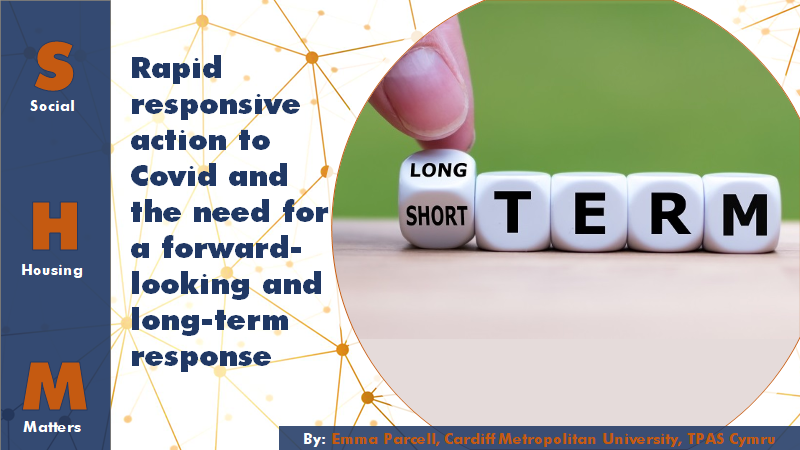
By: Emma Parcell ![]() @emmaparcell79
@emmaparcell79
The COVID-19 global pandemic has prompted rapid responsive action from both the UK government and the devolved nations across the United Kingdom. The national lockdown and the subsequent regional lockdowns that have occurred since March 2020 have placed restrictions and conditions on all citizens that has required people to stay home, however, this has only highlighted the urgent need for people to live in safe and suitable accommodation.
There was an urgent need to protect those sleeping rough to reduce the risk of them being affected by the pandemic, how can you follow the UK Governments instructions in March 2020 of “Stay Home, Protect the NHS and Save Lives,” if you are homeless and sleeping rough, where would you go and how could you reduce the risk of catching or spreading the virus. As a public health emergency, it prompted a rapid response to get people off the streets and into accommodation.
In its COVID response, the Welsh Government used its devolved power to implement policy changes by guiding local authorities setting out the clear expectation of the government that local authorities are to exercise their duty under Part 2 of the Housing (Wales) Act 2014 so that those who are homeless and vulnerable are to be considered as having priority need and should be provided with accommodation.
The Minister for Housing and Local Government Julie James MS wrote to local authorities providing guidance for supporting people sleeping rough, as a result of the Covid-19 outbreak, she wrote
“Our very clear expectation is that every Local Authority continues to do all it can to ensure no one is sleeping rough. As Minister for Housing and Local Government, I am clear that no one should be without suitable accommodation and support during this pandemic.” (Julie James MS, 2020)
As a result of additional funding from the Welsh Government and innovative working, local authorities were able to utilise the opportunity to provide homeless people with accommodation and support by using a range of accommodation options available with the local authority areas, such as hotels which were closed under the coronavirus restrictions. It can, however, be considered that these reactive measures although positive in that they provide rapid rehousing for homeless people in need, the measures taken will not be able to provide long-term and permanent accommodation for all, and will not eliminate homelessness in Wales in the longer term.
The Welsh Government have acknowledged this and have responded by implementing policy changes by setting out guidance for phase 2 which will provide an additional £20 million to support local authorities by enabling them to provide homelessness and housing-related support services for the longer term as part of their commitment and drive to eliminate homelessness in Wales. (Welsh Government, 2020).
Empty homes
Figures published by the Equality, Local Government and Communities (ELGC) stated there were “27,000 long term empty homes in the private sector”, (National Assembly for Wales, 2019) for clarity, long term empty homes are classified as homes that have been empty for more than six months. Properties become empty for many reasons, these include properties that have been inherited, difficult to sell, properties that have fallen into disrepair, and owners not having funds to maintain the property to name a few. Lavender and Wilson (2020) discuss the urgency of utilising empty homes but also consider the constraints and opportunities by stating,
“Returning long term empty homes into use is a social imperative at a time when housing need has never been higher. It is also a time of financial restraint and local authorities should be maximising their potential income and returning empty homes to use is an effective way to do this.”
There are opportunities for local authorities to utilise the homes that are empty in their areas to increase housing supply and help them to meet the local housing need as they execute their statutory duty. Empty homes are homes that are already available in communities and are a wasted resource if they are not brought back into use. Currently, there is no National Empty Homes Strategy in Wales, nor is there a statutory duty for local authorities to publish empty homes strategies; this results in inconsistencies with how empty homes are prioritised and dealt with by each local authority across Wales.
To maximise the potential benefits of bringing empty homes back into use, there is a consensus that a strategic approach would provide clarity by enabling different departments within local authorities to be aware that bringing empty properties back into use is a priority and a need for adequate resources to fulfil their statutory duty. (Lavender & Wilson, 2020; Parcell et al, 2020; Welsh Assembly, 2019)
Opportunities for a future-focused long-term response
The urgent need to provide accommodation to those who are homeless and requiring support brought on by the global pandemic delivered an opportunity for local authorities to be proactive and innovative in the way they took rapid responsive action to provide accommodation to those in need. There is now an opportunity to consider the strategic approach to empty homes by the Welsh Government in adopting a National Empty Homes Strategy for Wales with an obligation for local authorities to adopt and publish their Empty Homes Strategy.
By making this change to current policy the National Empty Homes Strategy for Wales will emphasise the benefits of bringing empty homes back into use as a clear indication of the Welsh Governments commitment to meeting housing needs by utilising existing resources. The National Empty Homes Strategy for Wales will provide local authorities with a framework which will enable them to be consistent in their approach to addressing empty homes by taking a corporate approach so that each department in the local authority understand that empty homes are a valuable resource and a priority.
There are opportunities for sharing good practice between each local authorities and providing a platform for learning, Welsh Government should build in an annual event in the National Empty Homes Strategy for Wales to encourage a joined-up approach to bringing empty homes back into use and meeting housing need.
Author bio
Twitter: @emmaparcell79
Emma Parcell is an active tenant volunteer and TPAS Cymru board member, in her own words:
I decided to enhance my learning and housing knowledge, by studying BSc Housing Studies at Cardiff Metropolitan University where I am currently in my final year. The degree has enabled me to gain a greater understanding of the housing sector and introduced me to theory, policy and practice, it has also enabled me to increase and enhance networking opportunities within the sector. I am currently working on my dissertation where I am looking at the impact of the pandemic on housing associations, the lessons that have been learnt and the plans for the future.
References
Julie James MS, 2020. Guidance for local authorities in supporting people sleeping rough – Covid-19 outbreak, Cardiff: Welsh Government.
Lavender & Wilson , 2020. Empty Homes, Bridgenorth: Housing Training and Consultancy Ltd.
Parcell, E., Morgans, A., McMurray, A. & Fury, M., 2020. What is the Role of Community-Led Housing Solutions in Reducing Empty Homes in Wales, Cardiff: Cardiff Metropolitan University.
Welsh Assembly, 2019. Empty Properties, Cardiff: Equality, Local Government and Communities Committee.
Welsh Government, 2020. Phase 2 – Planning Guidance for Homelessness and Housing Related Support Services, Cardiff: Welsh Government.



